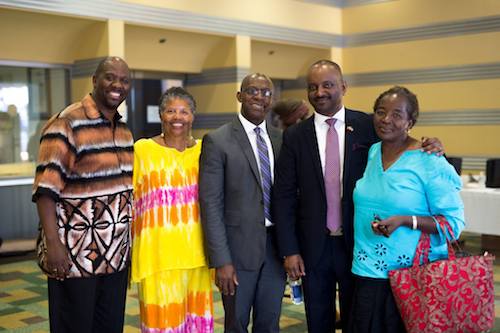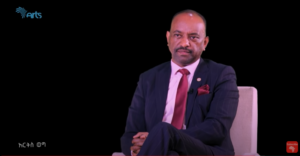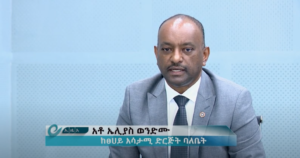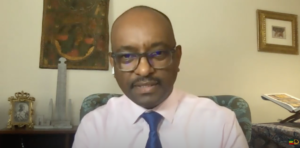IMMIGRANT MAGAZINE – During this time of political unrest and wavering visions of hope for the U.S. immigrant population at large, an act of community fellowship in Los Angeles can go a long way in demonstrating the potency of harmony within its immigrant community. TSEHAI Publisher’s newest imprint, the Harriet Tubman Press (HTP), accomplished this on Saturday, Oct. 14, during its inaugural publication of the poetry anthology Voices from Leimert Park Redux, hosted at the Vision Theatre in Leimert Park. While the community celebrated HTP’s one-year anniversary, TSEHAI was also commemorating its 10th year housed at Loyola Marymount University and its 20-year anniversary since establishment. The publishing house currently holds status as the only black-owned publishing institution within a university in the United States and Europe, since the closure of Howard University Press in 2011. The event featured esteemed panelists who offered vibrant discussion on the current state of affairs regarding immigration, marginalized communities, and how the unification of these communities can work towards building a greater future not only for Angelenos, but also for the United States as a whole.

(left to right) South African native, Reverend Kelvin Sauls of Holman United Methodist Church, professor of Ethnic and Women’s Studies at California State Polytechnic University, Dr. Toni Humber, Nigerian Provost of Clark Atlanta University, Peter Nwosu, Founder and Director of TSEHAI Publishers, Elias Wondimu, and Ugandan journalist and KPFK’s Spotlight Africa host, Asumpta Oturu
Throughout their discussion panels, participants touched on the xenophobia engulfing the U.S. population stemming from the current presidential administration. It seemed the panelists unknowingly used their diction as a form of subtle protest against the administration through their consistent use of the term “45” when referring to the U.S. president and his recent actions against the immigrant population. Elias Wondimu, founder of TSEHAI Publishers and its various imprints (including HTP) and an Ethiopian immigrant living in exile, faced similar struggles of forming a place for himself in this country while hoping to build an institution that would help speak to the needs of these marginalized communities. Wondimu established TSEHAI with the intention of producing knowledge on various cultures and diverse human experiences that were otherwise misrepresented in mass media and various literatures.
TSEHAI’s first imprint, the African Academic Press, was launched in 2002 to foster African knowledge production, filling the void created when publishing house Heinemann ceased publication of its famous African Writers Series. Wondimu contends that, “The role of African immigrants in America is getting stronger by the day. Africans are in academics, in business, in government … filling the gaping hole that exists between our communities.” In regards to this, Wondimu describes HTP as “a bridge to our brothers and sisters on this continent … a connector [of the gap between African-Americans and African immigrant communities].”
Harriet Tubman Press was established as a celebration of black voices in the academic and literary world. The press aims to focus specifically on the African-American experience in the United States, providing a platform for the past, present, and future issues that African-Americans face. Although the African-American experience is its central focus, HTP also recognizes the adversities faced by other marginalized communities of color. “This is not a struggle that can be … singular,” Wondimu states. “Bad decisions [in the U.S. government] will affect us all together and we have to collaborate to prosper.” His struggles with integration into U.S. culture mirror those of current immigrants who are feeling the heat of recent policy changes.
Wondimu, along with other panelists at the book launch, discussed the significance of unity between African-American immigrants and other marginalized populations who are determined to use their voice against the hostile and derisive environment encouraged by the climate of recent times. Regarding the African-American immigrant community and Wondimu’s efforts to bridge the African-American and immigrant communities as an African immigrant and publisher, featured panelist Congresswoman Karen Bass shared:
“The African American immigrant community is more diverse than people often realize. People like Elias really exemplify that and show what a symbiotic relationship immigrants in this country have for each other. Saturday’s event was a display of that synergy and it was a pleasure to participate.”
Concerned with the government’s conduct, yet optimistic of the power of unity, the program celebrated the American dream, drawing from the diversity of Los Angeles’ population, including immigrants. During the discussion “The Power of the Press,” panelists Congresswoman Karen Bass, CNN and NPR political commentator and analyst Angela Rye, HTP editor and award-winning poet Shonda Buchanan, and Wondimu spoke on the vitality of expressing the ethno-American experience through a literary, academic lens, especially during these intense times of burgeoning xenophobia. The radical voices of writers, poets, musicians, and other artists of color and marginalized status are longing to be heard in the United States, and HTP now serves as a ready and willing platform to serve such voices.
In the talk “Our Voices Are Stronger Together” in conversation with Rye, Supervisor Mark Ridley Thomas, former freedom riders and acclaimed political leaders Helen Singleton and Dr. Robert Singleton, and professor of psychology at Loyola Marymount University and former national president of the Association of Black Psychologists Dr. Cheryl Grills discussed the growing need to unify marginalized voices both in Los Angeles and throughout the United States. While the press is established as a center for the celebration of African-American voices, it further aims to exhibit the voices of other people of color and marginalized communities within the United States.
The final panel, “Coming Together on Social Justice Issues,” included South African native Rev. Kelvin Sauls of Holman United Methodist Church, Intellect Love Mercy Foundation Executive Director Umar A. Hakim, and commentator for TV One and host of “News One Now” Roland Martin. Participants furthered the discussion of collaborative efforts between marginalized communities, particularly through the lens of social justice issues. The panelists conveyed the ability of minority populations (i.e. African-Americans and African-American immigrants) to both address their group’s specific needs while also acknowledging overarching themes of marginalization and feelings of external contempt for ethnic and racial minority groups.
Throughout the event, cheers and claps of approval stirred within the audience and passersby, further affirming the need for institutions such as TSEHAI’s HTP. This program was certainly a historic celebration of milestones and hopeful futures for all marginalized communities of color. Whether in Los Angeles or other U.S. communities, expect TSEHAI and the Harriet Tubman Press to be a source of promise for the formerly unheard voices of the marginalized.
SOURCE: by Maraky A. Alemseged, Immigrant Magazine






